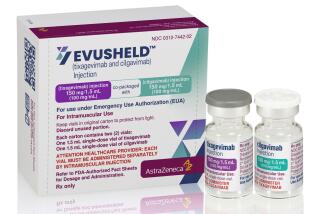6,000 Could Qualify for New AIDS Drug That Prolongs Life : AZT Believed to Block Ability of Virus to Reproduce
- Share via
WASHINGTON — An experimental anti-AIDS drug called AZT, tested on only 146 patients, will be given to as many as 6,000 AIDS victims, the first within weeks, because it holds “great promise for prolonging life,” the government said today.
Dr. Robert E. Windom, Assistant Secretary of Health, called AZT “the first therapeutic agent that seems to hold promise for some AIDS patients.”
But he emphasized at a news conference that AZT, azidothymidine, “is not a cure for AIDS.”
“Although the study results we are announcing hold great promise for prolonging life for certain patients with AIDS, uncertainties remain: uncertainties about possible toxic effects, uncertainties about long-term benefits or ill effects. We do not want to over-promise (AZT to) the thousands who now have AIDS.”
Medical Criteria
To be eligible for AZT treatment, AIDS patients must meet certain medical criteria, must not be in another drug test program and must have the recommendation of a doctor who is an expert on AIDS and is licensed to practice in the United States.
Dr. Anthony Fauci, director of the National Institute of Allergy and Infection Disease, said participants must have had a form of pneumonia common to AIDS patients-- Pneumocystis carinii pneumonia. He said about 60% of living AIDS patients have that infection.
As a result, Fauci estimated about 6,000 patients in the United States might be eligible to receive AZT. The capsules will be offered without charge within weeks by the manufacturer, Burroughs Wellcome Co., which hopes to receive government approval for marketing in December or January.
Burroughs Wellcome, in cooperation with the National Institutes of Health, has been testing the drug nationwide on 145 patients suffering from acquired immune deficiency syndrome, which has proved fatal because it robs the body of its ability to fight off infection.
One Death in Trial
AZT is believed to block the ability of the AIDS virus to reproduce.
Dannie H. King of Burroughs Wellcome said the current clinical testing began in February with 137 patients receiving a dummy drug and 145 getting AZT. There have been 16 deaths among the 137 patients receiving the dummy, and only one death among the 145 patients getting AZT.
The decision announced today meant that the 137 patients who were receiving a dummy drug will start receiving AZT immediately.
The group receiving the drug also had a decreased number of “other serious medical events, including opportunistic infections,” King said. In addition, they gained weight and had an improvement in daily activities.
Some Side Effects
The decision to open the drug to wider use was made Thursday by a group of federal health officials and drug company representatives.
The drug causes side effects including nausea, mild headaches and a temporary reduction in the body’s ability to generate new blood cells, company officials have said.
More to Read
Sign up for Essential California
The most important California stories and recommendations in your inbox every morning.
You may occasionally receive promotional content from the Los Angeles Times.












